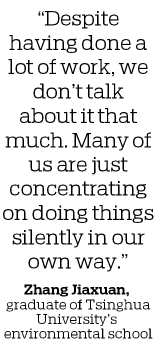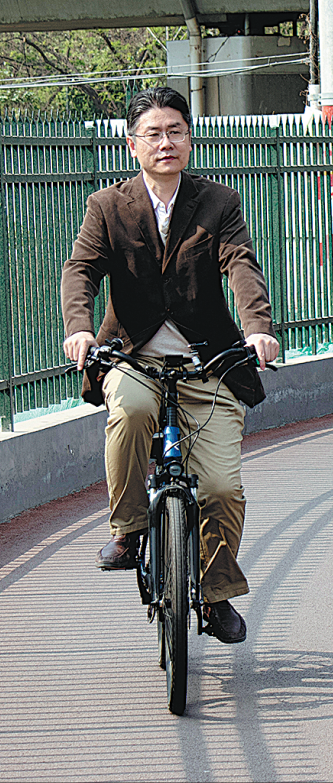LOW-CARBON LIFESTYLES GIVEN HUGE PUSH
Green-living advocates step up campaigns
Ni Huan became accustomed to seeing strangers at her home in Shanghai, with 15,000 people visiting it from September 2014 to November 2019.
"On average, five to six strangers arrived each day," she said, adding that the number would have continued to rise had not the family moved to another area after she had her daughter.
The visitors were attracted by a solar power system in the 44-year-old's apartment in the city's Minhang district, the first to use CIGS-a thin-film photovoltaic technology for civil use on the Chinese mainland.
The arrivals were fascinated by a facility capable of purifying water, while also using excrement from fish to nourish plants.
Ni is just one of the participants in a low-carbon campaign that began in China even before the country announced targets for carbon dioxide emissions to peak ahead of 2030 and for carbon neutrality to be realized before 2060.
Working for two decades in environmental protection, she said she viewed the arrival of the solar-powered system as an opportunity to experience the implementation of the government's preferential policies for low-carbon development.
"The experience has been very good," Ni said.
She spent nearly three months taking part in community hearings and in discussions with neighbors to win their consent for the system to be installed.
She said it took less than a week for State Grid to complete the work, adding that she also received a subsidy from the authorities.
In 2013, the central government introduced a national preferential policy for the development of solar energy, pledging a subsidy of 0.42 yuan (6.4 cents) for every kilowatt hour of power generated by solar power stations such as the one in Ni's home.
According to a regional policy unveiled in Shanghai a year later, Ni was entitled to another subsidy of 0.4 yuan for each kW/h of electricity produced for a period of five years.
While taking advantage of the free electricity provided by the system, she said she received 3,000 yuan from the government on average every year from 2014 to 2019.
News that a solar power facility had been installed at her home spread fast. Visitors soon arrived, plunging Ni's life into chaos.
The head of her residential block's management committee told Ni a group of 10 pupils were coming to her home. However, the apartment was quickly overwhelmed by more than 40 visitors.
Their keen interest in a low-carbon environment inspired Ni to launch the Shanghai Green Light-Year Environmental Service Center in 2016 to better advocate sustainable lifestyles.
Many student volunteers with the NGO helped visitors to her home and assisted at low-carbon demonstration facilities elsewhere. In 2018, the organization began transforming itself into a sustainable education institution.
Ni said at least 50 families in Shanghai and nearby areas installed solar power stations after visiting her home. The NGO has also sowed the seeds of interest among the younger generation.
Many volunteers choose majors related to the environment and sustainable development for their further studies. "Some students' experience with the NGO has changed their interests," Ni said.
Factories closed
In Gulin county, Sichuan province, Fu Demin, 39, has become a firm low-carbon advocate after being involved for years in her family's business, which had high emission levels.
The family used to run half of the more than 60 brick factories in Gulin, employing over 1,000 workers.
However, in 2015, local authorities closed the family's factories due to their high emission levels. "I felt the Chinese government's deep resolve to control industries with high emissions," Fu said.
She then looked for openings in environmental protection, an area she believes boasts rich opportunities.
Having no related knowledge, Fu took up whatever environment-related training she could find in 2016.
A year later, she decided to concentrate on carbon after discovering that China had been piloting carbon trading. Meanwhile, seven central government bodies published a guideline for establishing a green financial system.
"I still spend about 300,000 yuan a year on carbon-related education," Fu said.
She and four of her siblings tried to include carbon asset management as a business category at a company they run after hearing that the National Development and Reform Commission held a conference in late 2017 on setting up a national carbon market for the power generating industry.
Fu said the category was so unfamiliar that it was not included in the local commerce authority's registration system.
She has also been attempting to get local entrepreneurs to adopt a low-carbon approach to development.
In 2019, Fu and more than 50 entrepreneurs jointly launched Zhongtan Lvlinbao Low Carbon Technology Co in Chengdu, capital of Sichuan province. One of the company's businesses now encourages a low-carbon approach, with a training program themed on carbon asset management.
More than 200 entrepreneurs have taken part in the program, which features two-day training sessions every month, Fu said.
The company and the education department in Sichuan plan to launch a pilot program in a university town in Yibin to promote low-carbon sustainable lifestyles among students.
Cycling to work
Since 2016, Yang Xinmiao, deputy director of Tsinghua University's Institute of Transportation Engineering, has been commuting by bicycle to promote a low-carbon lifestyle.
Like many of his colleagues, Yang used to drive to work despite only living about 1 kilometer from the campus in Beijing.
This changed in 2016, when a student chose to wear a face mask all the time due to concerns about poor air quality.
Yang decided to cycle after the student criticized him for driving to work, describing this practice as environmentally unfriendly. His determination to take to two wheels increased after he was recommended a power-assisted bicycle.
Half of Yang's colleagues, who number in their thousands, have also decided to cycle to work.
Cycling has become increasingly popular since Yang persuaded the university management and authorities in Haidian district, where the institution is located, to set up a bike lane between the university and the residential block where many Tsinghua teachers live.
In 2017, with the help of a friend from the Jiusan Society, one of China's non-communist parties, Yang submitted a proposal to promote power-assisted cycling to the country top political advisory body, the Chinese People's Political Consultative Conference.
Last year, he also managed to have another proposal submitted to the body's Beijing committee, in which he suggested improving the capital's cycling infrastructure.
His proposals received a positive response. In September, the Beijing Municipal Commission of Transport promised to introduce a series of measures to promote commuting by bicycle, including exploring the possibility of setting up cycle lanes along the city's waterways.
Yang recently collaborated with the Chinese University Cycling Association. With his help, a member of the association from Peking University drafted a plan for a cycle lane network in Taiyuan, capital of Shanxi province. The pair, together with a local NGO, plan to lobby authorities in the city to implement the plan.
"Generally, the situation is good. ... Things are proceeding quicker than I imagined," Yang said of his efforts to promote cycling.
Meanwhile, Zhang Jiaxuan, 22, a graduate of Tsinghua University's environmental school, has been doing everything she can to lead and promote a low-carbon lifestyle. Her efforts include taking public transportation and avoiding the use of air conditioners as much as possible.
Zhang's enthusiasm for climate-related issues resulted in her being elected head of the Global Alliance of Universities on Climate youth delegation to the 2019 UN Climate Change Conference in Madrid, the Spanish capital.
Launched that year, the alliance's aims are to increase cooperation on climate-related issues, foster greater engagement with climate stakeholders, and promote environmental practices by universities, in line with the UN Sustainable Development Goals and conventions on climate change.
In discussions with climate-change followers at home and abroad, Zhang has found that while high-profile campaigns on the issue are being promoted in the West, climate change is being tackled in a low-key manner in China and other Asian nations.
"Despite having done a lot of work, we don't talk about it that much. Many of us are just concentrating on doing things silently in our own way," she said.
houliqiang@chinadaily.com.cn



















